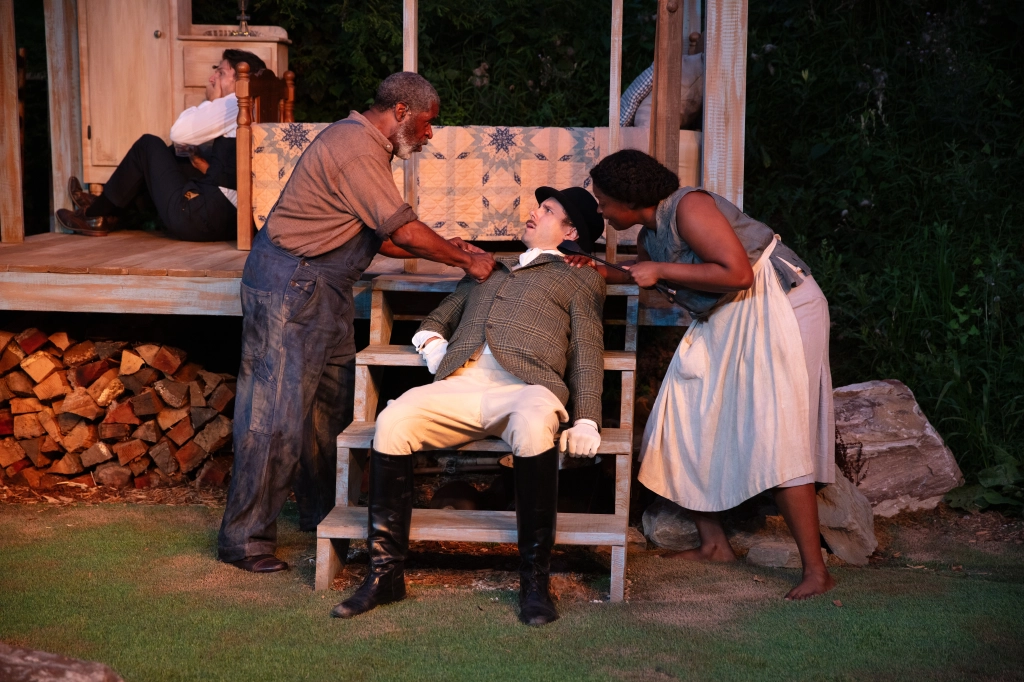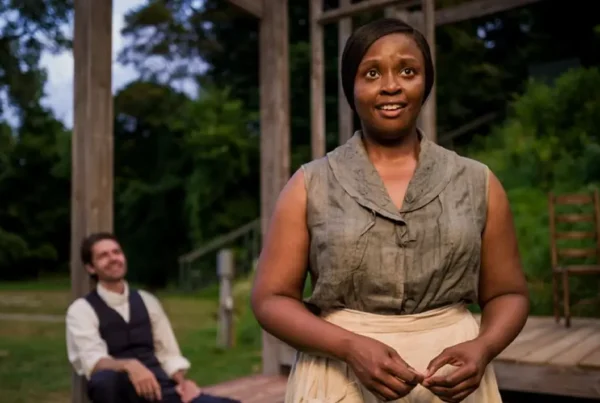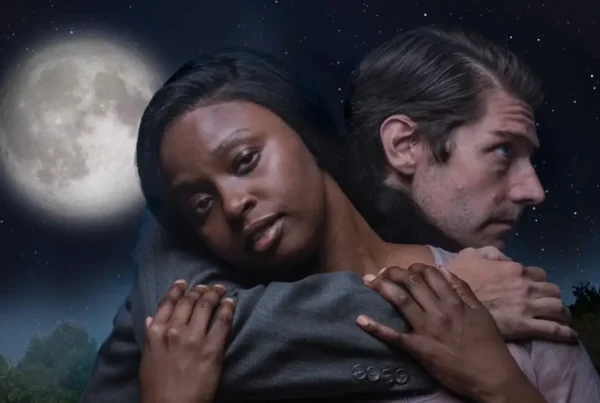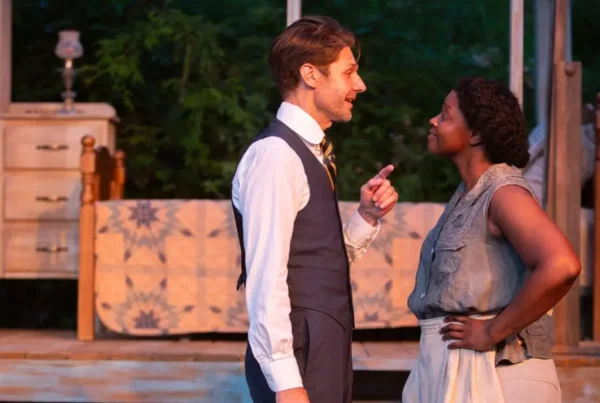
Pittsburgh Quarterly – It is a precept of Zen art to incorporate the spaces between objects into a creation, and to consider them just as significant as the objects depicted. In flower arrangement, for example, the areas between the branches are just as important – if not more so – than the branches themselves.
We find the embodiment of this ethos in Quantum Theatre’s new production of Eugene O’Neill’s “A Moon for the Misbegotten” (1943), which is crucial, as this work rises or falls on the acting, and the acting succeeds on the delivery – not just of the lines, but the silence the actors place between the lines. The poet and novelist Lawrence Durrell called this quality the “interlinear” — that is, what transpires that is not explicitly stated. And as so much transpires in O’Neill that is not stated, achieving this level of expression is critical to the performance of this show, which was not only his final work, but perhaps his most subtle.
We know O’Neill to have been a disciple of ancient Greek drama and, as in the plays of Sophocles, most of the action involves two characters at a time – although a third may be present — with us as the audience playing a kind of mute chorus watching them.
If I had to characterize the direction of J. Cody Spellman, it would be with one word: reverence. Reverence for the breath in O’Neill’s dialogue; reverence for the interpretive expression of the actors – at least the three main characters (more on the two cameo roles, later), and reverence for the nature of the setting, as this play is performed outdoors with the sonic contribution of crickets, wind, and distant trains. (Once again, it would not be a Quantum production without at least one sonorous train whistle – in this case wonderfully appropriate to the context).

L to R: Brett Mack, Wali Jamal, Allen Law, & Melessie Clark. Photo by Beth Barbis, courtesy Quantum Theatre.
All the scenes are pas de deux, even when three players are technically on the stage. The most powerful are those between Josie Hogan (Melessie Clark), and Phil Hogan (Wali Jamal), who present a very convincing daughter/father relationship, and a familial backstory that is revealed over the course of an evening with the speed of encroaching darkness.
The action starts, like a Greek play, in medias res, with Josie’s agitated brother Mike (Jordan Drake), departing the Hogan homestead, and we never see him again. This is an interesting twist on the classic “leaving home” trope, as it’s usually the abused female character who chooses to flee. However, much as Shakespeare often does with such reversals, O’Neill is signaling us by this act that things will not transpire in the conventional way. And we also soon discover that all the characters are unreliable – they lie not just to each other, but to themselves – which is one of the most difficult scenarios for actors to portray. But the cast is so convincing that we sympathize with them for being disingenuous, even after they admit their mendacities; it’s as if Jesus is walking around in the woods behind the set whispering, “they know not what they do.”
There is a consecution to outside, nighttime performances: the sound and the light evolve — the former growing stronger and the latter weaker. On the sensory level this can be ameliorated through technical means, but something much deeper transpires – the normal pacing of dialogue, the internal beat of it, changes; overtaken as it is by the stronger rhythms that nature manifests. The throbbing clamor of insects grows and becomes like the ride cymbal in a jazz band. No matter what you want to say you have to work with the beat and, what you choose not to say – the silence between words – takes on the implications of a “rest” in a musical score. And with O’Neill, the caesura is everything. Director Spellman conducts these passages with restraint, allowing the rhythm of the dialogue to find its own, living meter.
The central character, James Tyrone, Jr. (Brett Mack) – you may remember him from O’Neill’s previous work, “Long Day’s Journey into Night” – has to navigate not only the exigencies of this plot, but must carry the burden cast on him by the precursor play, which it is likely more people have seen than the present one. We know this man. He is a drunk, a liar, a scoundrel, and yet as Mr. Mack plays him, so disarmingly likeable that we cannot condemn him, even as the desperation of his soul unspools before us like someone who cannot hold the guts of his conscience down. Perhaps this is why Josie is hopelessly attracted to him: he teeters so deliciously between benevolence and malevolence that she begins to conflate the two emotions. For example, is he being protective or selfish when he pours himself a drink without offering one to her, declaring, “Take a big drink of moonlight instead”?
It takes a long time to figure Tyrone out, not because of the actor’s subterfuge; but rather, the playwright’s. It seems as if O’Neill was reading Dashiell Hammett while writing this work. There’s a touch of noir to it. And purposeful – even cloying – mystery.
The scenes between Josie and her father Phil, Phil and Tyrone, and especially between Josie and Tyrone at the end — enacted in the dead of night, under the play’s watchful moon, always present as a kind of third character – transpire in a glissando of language that is astonishing, and continually softens, to the point of somnolence. It’s surreptitious enchantment, like making the adagio the final movement of a symphony.
The set, designed by Stephanie Mayer-Stayley, utilizes elements of modernism and magic realism. It’s basically the skeleton of a little farm cottage, built smaller than life-size, projecting a dollhouse quaintness. The conceit of a wall-less building absolutely works in a drama where the voices are this big; you just couldn’t stuff all the lyrical intensity inside . . . without it – and the personalities — bursting out.
C. Todd Brown is a master at marrying natural and electrical light – there are no seams to the crepuscularity that envelopes the stage during evening performances. And even when the lighting becomes wholly artificial, we feel that the illumination is a flesh-like, living thing, not a synthetic embellishment. We can see the effulgence of these souls coming towards us. It’s like moonlight in reverse.
Ryan McMasters’ sound design and Damian E. Dominguez’ costumes also add vibrancy to the total effect of this production.
One of the prevailing takes on this play is that if the acting isn’t superb, the show doesn’t work. Fortunately, this cast is superlative. Mr. Jamal is masterful, especially in how he modulates his character’s scheming interiority to his innocent, outward demeanor. His drunk persona is nuanced, and the way he acutely transitions through multiple levels of prevarication is beguiling.
Likewise, Ms. Clark is really playing three versions of Josie Hogan – who Josie thinks she is, who she suspects she is, and who she turns out to be. It’s like watching a person go through five years of psychoanalysis in one night, desperately trying to heal herself; a lesser actor could not pull this off so convincingly.
In fact, all of the three major characters are multidimensional; however, Mr. Mack’s Tyrone is the least open to interpretation – probably because O’Neill based the role on his own brother, and famously objected to actors taking what he thought were too many liberties with their renditions. Mr. Mack’s crutch-gesture is placing the heel of his palm to his forehead to register emotion. (Think of Bogart rubbing his ear during “The Big Sleep” whenever he wanted to signal deep thought).
The only character who seems out of place in this menagerie of Freudian personalities is T. Steadman Harder (Allen Law), who speaks affectatiously, like an English twit; in fact he appears to have wandered in from the set of “The Importance of Being Earnest” still in the role of Algernon. He’s obviously been directed to go over-the-top, but I’m not sure that this level of hyperbolic gesticulation is appropriate to a drama awash in deep lyricism and serious moonlight.
In the end, this production melds with its setting to such an extent that the effect is mesmerizing. What we are left with is pathos, not sentimentality, and in an enigmatic way, neither are we over-imbued with a sense of tragedy. Quantum nails the unique psyche of this play, which is not easy to do, by letting the space between the lines and speeches become a world in which to listen and breathe, and for damaged souls to try to heal, even if there is no hope of doing so.
A MOON FOR THE MISBEGOTTEN continues through August 25th at Longue Vue Club, Verona. $20-68. 412-362-1713 or www.quantumtheatre.com





